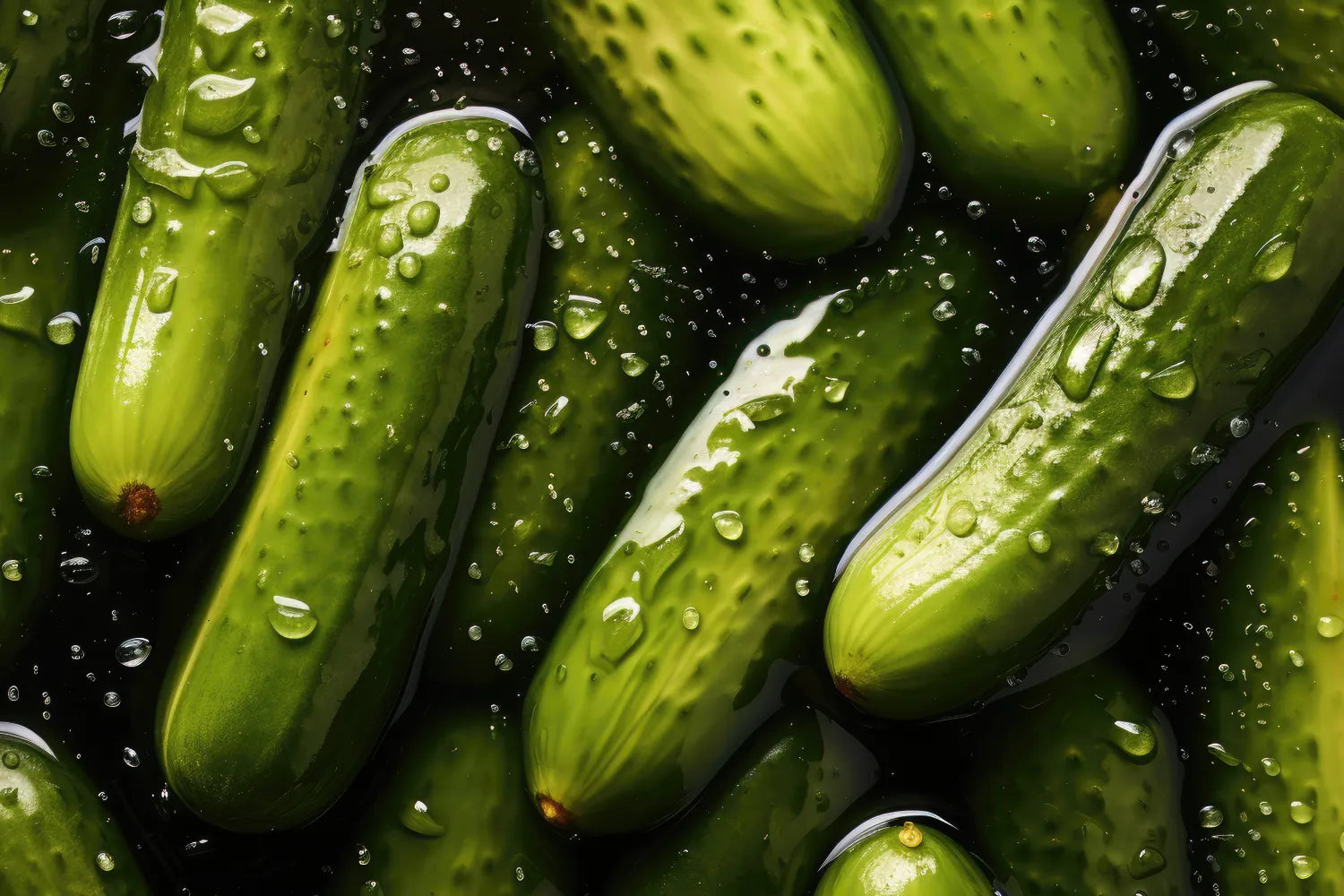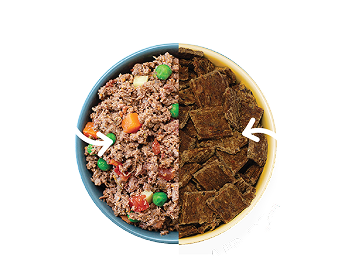
Can Dogs Eat Pickles? Are Pickles Bad for Dogs?
Have you ever caught your dog eyeing a crunchy, tangy pickle on your plate and wondered if it's safe to share just a bite? At A Pup Above, we understand that every crinkle of a snack bag or chop of a veggie has our pups perking up in anticipation.
Pickles, with their irresistible snap and zesty flavor, might seem like a fun treat to toss to your dog, but it's important to pause and consider what's best for their health. Interested in discovering more? We've got you covered.
Read on as we dive deep into the world of dogs and pickles to unpack whether these crunchy snacks are treats or trouble for your loyal companion.
What Are Pickles?
What exactly is a pickle, anyway? At its core, a pickle is simply a cucumber that's been submerged in a brine of vinegar, salt, and various spices — transforming it from a plain vegetable into a zesty, flavorful treat. While this process does wonders for our taste buds, what does it mean for our dogs?
Technically, dogs can eat pickles. They aren't toxic, and a nibble here or there isn't likely to send your pup to the vet. However, just because they can eat them doesn't mean they should.
Pickles come packed with sodium and spices that can be anything but beneficial for your pet. High sodium levels can lead to dehydration and sodium ion poisoning, while the garlic and onions often found in pickle brine are toxic to dogs. This makes pickles a risky treat that might be best left out of your dog's diet.
Are Pickles Good for Dogs?
We've touched on why pickles might not be the best snack choice for your pup, given their high sodium content and the presence of potentially harmful spices. But is there any upside to letting your dog have a small lick of a pickle?
To put it simply, not really. When we strip it down, the tiny bit of cucumber left in a pickle doesn’t carry enough nutritional benefit to make it worthwhile. Cucumbers in their raw, fresh form? Sure, they're great!
They’re hydrating and low in calories, making them a crunchy, healthy snack for dogs when plain. But once they've been pickled? The game changes. The nutritional perks of the cucumber are outweighed by the risks of the pickle's added ingredients.
So, while dogs can technically munch on a pickle slice without immediate harm, the potential health risks and lack of significant benefits make it clear — they're better off being enjoyed by humans only. Instead, why not keep a stash of cucumber slices in the fridge for a dog-friendly snack? That way, you’re keeping it safe, healthy, and still fun for your dog.
How Much Pickle Can My Dog Eat?
If you're really keen on treating your dog to a pickle, let’s talk portion control to keep it fun and safe. Think of a pickle as a tiny garnish in the grand meal of your dog’s daily diet — very, very tiny!
For a bit of pickle fun, consider offering just a small nibble, no bigger than a dime, and make this an occasional treat rather than a regular part of their diet. This way, you manage to keep those sodium levels in check and avoid any spice-related mishaps.
For smaller breeds, even this small amount may be too much, so you might just stick to showing them the pickle and letting them dream.
Can My Dog Eat Dill?
Now, let's sprinkle a little flavor into this conversation with a dash of dill. If you've ever wondered whether this herb can make its way into your dog's bowl, we've got some good news — dill is dog-friendly!
Dill can be a safe and tasty addition to your dog's diet in moderation. It’s known for its light, herby flavor, and it carries some nice perks like aiding digestion and freshening breath. Plus, it’s low in calories, which makes it a guilt-free sprinkle on top of your dog's regular meals.
However, like all good things, dill is best served in moderation. A pinch here or there is plenty to give them a taste without overwhelming their system.
Remember, the key to introducing any new food, including herbs like dill, is to start small. Watch how your dog reacts, and always consult your vet if you’re unsure about quantities or frequency.
Are Spicy Pickles Worse for Dogs?
When it comes to spicy pickles, it’s best to hold the spice and pass the plain. Spicy foods can be a fun kick for human taste buds but can spell trouble for our dogs. The spices that give pickles that extra zing — like chili peppers and garlic — aren't just unpalatable for most pups; they're outright harmful.
Spices can cause stomach upset in dogs, and ingredients commonly found in spicy pickles, such as onions and garlic, are toxic to dogs. These can lead to gastrointestinal irritation and could potentially cause red blood cell damage. So, if you're snacking on spicy pickles, it's wise to keep those treats to yourself and save your pup from the spice.
Can My Dog Drink Pickle Juice?
On to pickle juice — while it might be tempting to let nothing go to waste, pickle juice is a definite no for dogs. This briny solution carries a high amount of salt and vinegar, along with spices and flavors that are not dog-friendly. Ingesting pickle juice can lead to dehydration and salt toxicity, which are serious health concerns that could require a trip to the vet.
Additionally, the acidic nature of vinegar and the potent spices can irritate your dog's digestive system, leading to discomfort or even more severe issues. Instead of sharing your pickle juice, keep your dog hydrated with what they love and need most — fresh, clean water.
What Are Some Dog-Approved Nibbles?
While pickles might be off the menu, there’s a whole world of dog-approved nibbles that are not only safe but also beneficial for your dog.
Here are some top picks that are sure to get tails wagging:
Cucumber Slices
Cucumbers are a fantastic treat for dogs. They’re low in calories, high in water content, and they provide a satisfying crunch. Slice them up for a hydrating snack, especially on warm days, and watch your dog enjoy every bite without any worry.
Carrot Sticks
Carrots are another excellent choice for a healthy, crunchy treat. They’re packed with fiber and beta-carotene, which helps maintain good eye health and a strong immune system. Raw or cooked, they make a nutritious snack for dogs of all sizes.
Apple Slices
Apples provide a sweet treat that’s loaded with beneficial nutrients like vitamins A and C, as well as fiber for digestive health. Just be sure to remove the core and seeds before offering them to your pup, as apple seeds contain cyanide which is harmful in larger quantities.
Plain Boiled Chicken
For a meaty treat, you can’t go wrong with plain boiled chicken. It’s high in protein, low in fat, and very gentle on the stomach, making it a perfect snack for pups who need a little extra something in their diet. Just make sure it’s cooked without any added spices or seasonings.
Watermelon
Watermelon is a juicy, refreshing snack that's perfect for hydrating your dog on a hot day. It's low in calories and packed with vitamins A, B6, and C, as well as potassium. Make sure to remove any seeds and the rind to prevent any choking hazard or digestive upset.
The Bottom Line
So, can dogs eat pickles? Technically, yes — but it’s not really the best idea. Between the high sodium, spices, and potential toxins like garlic and onions, pickles aren’t exactly a snack you want to toss to your pup.
There are much healthier, safer options out there that not only keep your dog happy but also support their health. Instead of navigating the risks with human snacks, why not give your dog something you know is both tasty and nutritious?
At A Pup Above, our human-grade, sous-vide meals are packed with real ingredients and gently cooked to lock in all the good stuff your dog needs. You can feel great knowing exactly what’s in every bite, and your pup will be thrilled with the flavor.
Try our meals today and see the difference!
Sources:
How Are Pickles Made? | Wonderopolis
Onion, Garlic, Chive, and Leek Toxicity in Dogs | VCA Animal Hospitals
Can Dogs Eat Dill? 4 Health Benefits of Dill for Dogs | MasterClass
Can dogs eat watermelon? Ways to feed your pup fruit safely | USA Today
Top Stories

Why Do Dogs Lick Their Paws?

Why Do Dogs Whimper & Make Noises in Their Sleep?

Healthy Vet-Approved Homemade Dog Food Recipes

How To Cook Sweet Potatoes for Dogs






















